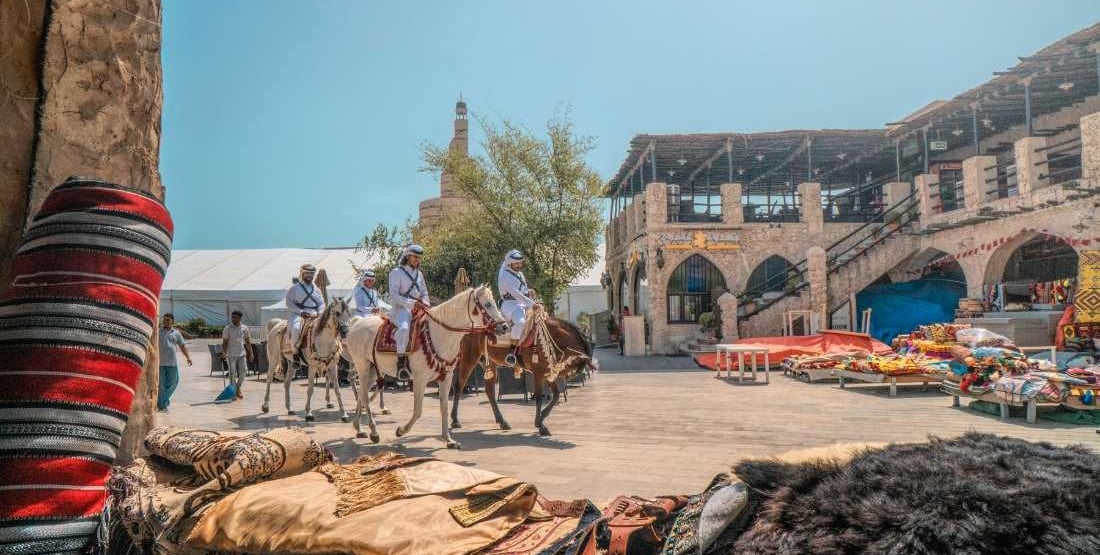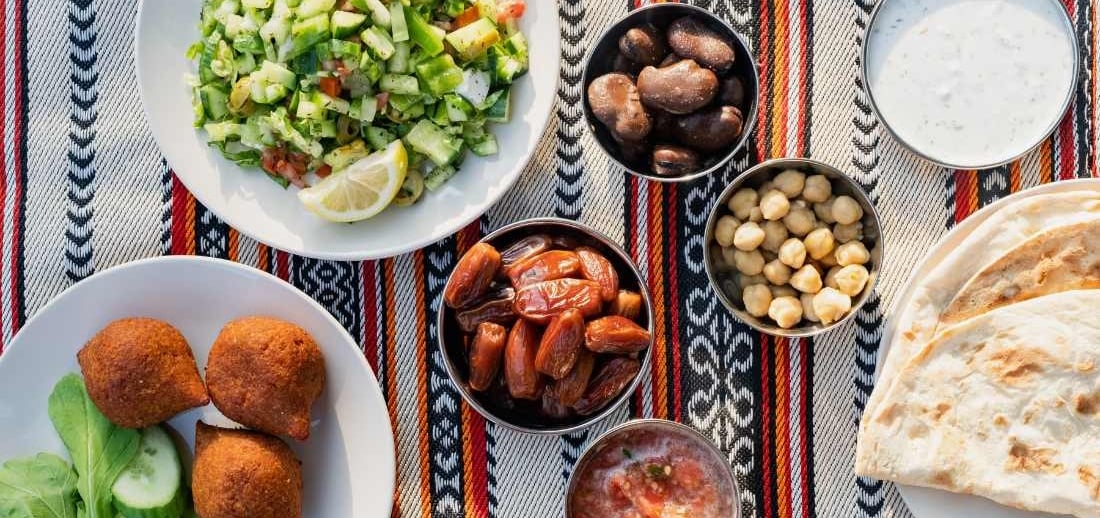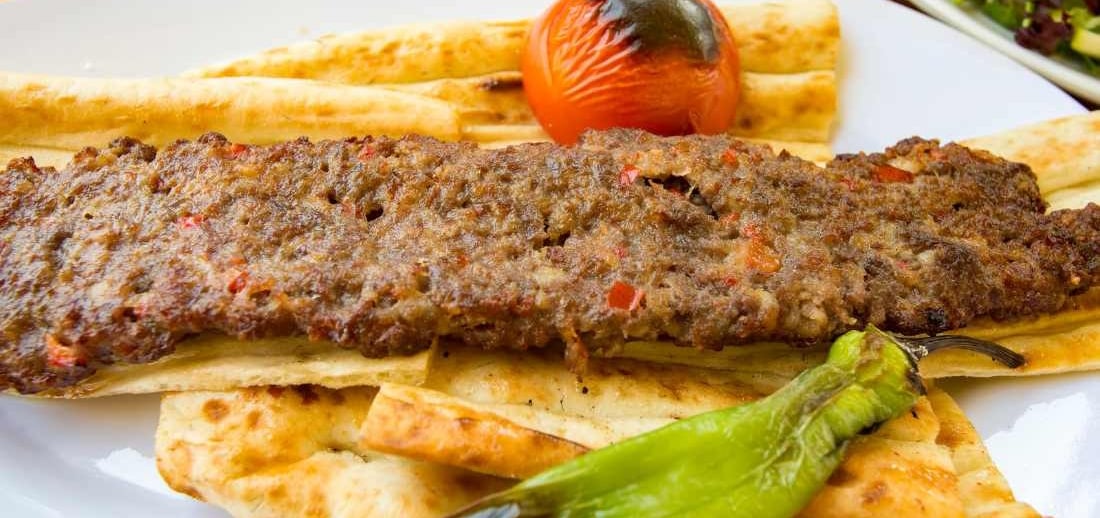The Ultimate Middle Eastern Food Festival Experience
Join George Eleter on the ultimate guide to Middle Eastern food festivals. Discover rich traditions, delicacies, and tips for navigating the vibrant atmosphere.


Tips and Tricks by George Eleter
Introduction
Middle Eastern food festivals are vibrant celebrations of the region's culinary delights and cultural heritage. These events offer an immersive experience where you can savor a diverse array of homemade dishes, enjoy traditional music and dance performances, and explore informative cultural exhibits.
Meet George Eleter, a seasoned chef with a deep passion for Middle Eastern cuisine. George has curated the ultimate guide to navigating and savoring the flavors of these festivals. With his expert advice, you'll be well-equipped to enjoy an unforgettable food festival experience.
Whether you're a first-time attendee or a seasoned festival-goer, this guide from George Eleter's Cooking Blog will provide you with insider tips and tricks. From must-try delicacies to practical advice on making the most out of your visit, get ready to embark on an amazing culinary adventure.
And speaking of distinctive flavors, these festivals are the perfect opportunity to explore the distinctive flavors of Mediterranean and Middle Eastern cuisine. Soak in the rich aromas and indulge in dishes that showcase the cultural diversity of the region.
Understanding the Rich Traditions of Middle Eastern Food Festivals
Middle Eastern food festivals are more than just gatherings for culinary indulgence; they are vibrant cultural events that play a crucial role in preserving and sharing deep-rooted traditions. These festivals offer a glimpse into the rich heritage of the region, where every dish tells a story of community, family, and history.
Cultural Significance
These festivals serve as important communal gatherings. They bring people together to celebrate shared heritage, strengthening communal bonds.
The emphasis on homemade dishes highlights the authenticity of the flavors. Families often pass down recipes through generations, ensuring that traditional cuisine remains an integral part of cultural identity.
Homemade Delicacies
Dishes like kibbeh, grape leaves, and falafel are staples at these festivals. Their preparation involves intricate techniques that showcase the culinary skills honed over centuries.
Hummus plays a versatile role in Middle Eastern cuisine, often featured in meze platters that allow festival-goers to sample a variety of flavors in one sitting.
The authenticity brought by these homemade dishes cannot be overstated. Each bite offers a taste of history, making these festivals a must-attend for anyone eager to explore genuine Middle Eastern flavors.
For those looking to delve deeper into Middle Eastern cuisine, you can refer to this beginner's guide to Middle Eastern Recipes. It provides valuable insights into the rich history and key ingredients of Middle Eastern cuisine. From iconic dishes like hummus and falafel to refreshing salads and indulgent desserts, this guide is perfect for anyone seeking to immerse themselves in the culinary delights of the region.


Must-Try Delicacies: From Mezze to Desserts
Indulging in a Middle Eastern food festival means treating your taste buds to an array of exquisite delicacies. The iconic trio of kibbeh, grape leaves, and falafel stands out as staple favorites for festival-goers.
Kibbeh: These deep-fried or baked bulgur wheat and meat croquettes are a must-try, offering a perfect blend of spices and textures.
Grape Leaves: Often stuffed with a savory mixture of rice, herbs, and sometimes meat, they provide a burst of flavor in every bite.
Falafel: These crispy chickpea or fava bean patties are not only delicious but also a fantastic plant-based option.
The creamy goodness of hummus deserves its own spotlight. This versatile dip made from blended chickpeas, tahini, garlic, and lemon juice is often found in the meze platters at food festivals. You can enjoy it with pita bread, vegetables, or even as a complement to other dishes.
Exploring the enchanting world of Middle Eastern sweets reveals popular confections like baklava and knafeh:
Baklava: Known for its flaky layers filled with nuts and sweetened with syrup or honey, it’s a dessert that perfectly balances sweetness and crunch.
Knafeh: This cheese pastry soaked in sweet syrup and topped with crushed pistachios offers a unique texture and flavor profile that's hard to resist.
Each bite at these festivals is an invitation to savor the rich culinary traditions that define Middle Eastern cuisine.
Navigating the Food Bazaars: Tips for Trying a Little Bit of Everything
Middle Eastern food bazaars are a treasure trove of culinary delights, offering an array of delectable options that can overwhelm even seasoned festival-goers. To make the most out of these abundant food options, consider these tips for efficient portion management and strategic tasting.
Portion Management:
Start with smaller portions to allow room for more variety. Many vendors offer sample sizes - take advantage of these to taste without filling up too quickly.
If attending with friends or family, sharing plates can help you try more dishes without overindulging.
Identify must-try items beforehand so you can allocate your appetite wisely.
Strategic Tasting Approach:
Begin by taking a leisurely stroll around the bazaar to see all available options. This helps in mapping out your tasting journey.
Begin with lighter fare like salads and mezze before moving on to heavier dishes such as meats and desserts.
Keep hydrated with water or traditional Middle Eastern beverages like mint tea, which aids digestion and refreshes your palate.
By managing portions and adopting a strategic tasting approach, you can savor the full spectrum of flavors that Middle Eastern food bazaars have to offer.
Immerse Yourself in the Festive Atmosphere
Middle Eastern food festivals are not just about the cuisine; the entertainment plays a vital role in creating an immersive and joyous ambiance. The vibrant entertainment, such as live music and traditional dance performances, sets the stage for a truly memorable experience.
Key Elements of Festival Entertainment:
Live Music: Enjoy the rhythmic beats of Middle Eastern music styles like Dabke, Tarab, and Rai. These genres have rich melodies and captivating rhythms that invite everyone to join in the celebration.
Dance Performances: Traditional dance performances, including belly dancing and the energetic Dabke, are often central attractions. These dances tell stories of joy, heritage, and unity, bringing the crowd together in shared enjoyment.
"The blend of music and dance at these festivals creates an atmosphere where you can't help but feel connected to the cultural heartbeat of the Middle East." - George Eleter
Getting Inspired to Dance:
Witnessing these performances can be inspiring. Don’t hesitate to join in the fun! Many festivals include interactive dance sessions where attendees can learn basic steps. For those seeking a deeper understanding of Middle Eastern dance forms, resources like Gilded Serpent offer valuable insights into this art form's history and techniques.
By immersing yourself fully in the entertainment offerings, you gain a deeper appreciation for Middle Eastern culture. The music and dance don’t just entertain—they enrich your understanding and enjoyment of everything the festival has to offer.
Beyond Food: Exploring Artisanal Crafts and Cultural Exhibits
Middle Eastern food festivals are more than just about delicious food; they are also a place where you can discover handmade crafts and cultural displays. These aspects make the festival experience more meaningful, allowing you to connect with the heritage of the region.
Artisanal Crafts:
Festivals often showcase items that are made by hand, such as beautiful jewelry, colorful fabrics, and traditional pottery. These crafts not only demonstrate the skills of the artisans but also carry stories of cultural importance that have been passed down for generations.
By purchasing these one-of-a-kind products, you are supporting local artisans and contributing to the preservation of traditional craft techniques.
Cultural Exhibits:
Informative exhibits explore the past, art, and traditions of Middle Eastern communities. You might come across displays featuring traditional clothing, ancient objects, or captivating photographs of scenic landscapes.
There may be opportunities for guided tours or interactive activities where you can learn more about the cultural background behind the delicious dishes you're enjoying at the festival.
By taking the time to appreciate these handmade crafts and cultural displays, you will gain a deeper understanding of Middle Eastern culture and make your festival visit even more special.
Supporting Causes: The Charitable Side of Middle Eastern Food Festivals
Middle Eastern food festivals are more than just a sensory delight; they also play a crucial role in supporting charitable causes. Many of these festivals use their earnings to fund projects that directly benefit the community.
Philanthropic Efforts
Attending a Middle Eastern food festival often means contributing to various philanthropic efforts. The funds raised typically support:
Local community centers
Educational programs
Healthcare initiatives
Disaster relief efforts
Ways You Can Contribute
As an attendee, your participation can have a meaningful impact. Here are some ways you can support these causes:
Purchasing Food and Crafts: The money spent on delicious dishes and beautiful artisanal crafts often goes directly into funding important community projects.
Participating in Auctions: Many festivals hold silent auctions featuring unique items, where the proceeds benefit charitable organizations.
Donations: Some festivals provide options for direct donations, allowing you to contribute even more to the cause.
Your involvement at these festivals not only enriches your cultural experience but also supports vital community initiatives.


Essential Dos and Don'ts for a Seamless Festival Adventure
Navigating Middle Eastern food festivals can be an exhilarating yet overwhelming experience. Here are some practical tips for attending to ensure you have a seamless adventure:
Dos:
Arrive Early: Getting there early means beating the crowds and enjoying the freshest foods.
Bring Cash: While many vendors accept cards, cash can speed up transactions and avoid potential technical issues.
Wear Comfortable Shoes: Festivals often involve a lot of walking, so comfortable footwear is essential.
Sample Widely: Try small portions from various stalls to get a comprehensive taste of the festival offerings.
Hydrate: With all the delicious food sampling, staying hydrated is crucial.
Don'ts:
Overload Your Plate: Piling on too much food at once can lead to waste and overwhelm your palate.
Skip the Entertainment: The music and dance performances enrich the experience and provide cultural context.
Be Shy to Ask Questions: Vendors are usually passionate about their dishes and happy to share insights.
Forget Basic Etiquette: Being polite, patient, and respectful goes a long way in enjoying the festival.
Following these tips for attending Middle Eastern food festivals will help you make the most out of your culinary adventure, ensuring that you savor every moment.
Bringing the Festive Spirit Home: Recipes to Try From George Eleter
Unleash your inner chef with handpicked recipes from George Eleter that pay homage to the vibrant flavors of Middle Eastern gastronomy. These culinary creations, inspired by Middle Eastern cuisine, allow you to recreate the magic of food festivals right in your own kitchen.
1. Classic Hummus
Ingredients:
1 can chickpeas (drained and rinsed)
1/4 cup tahini
2 tbsp olive oil
1 clove garlic (minced)
Juice of 1 lemon
Salt to taste
Instructions:
Blend chickpeas, tahini, olive oil, garlic, and lemon juice until smooth.
Add water if needed for a creamier texture.
Season with salt.
Serve with pita bread or fresh vegetables.
2. Falafel
Ingredients:
1 cup dried chickpeas (soaked overnight)
1 small onion (chopped)
2 cloves garlic (minced)
1/4 cup fresh parsley (chopped)
1 tsp ground cumin
1 tsp ground coriander
Salt and pepper to taste
Oil for frying
Instructions:
Blend chickpeas, onion, garlic, parsley, cumin, and coriander in a food processor.
Form mixture into small balls or patties.
Heat oil in a pan over medium heat.
Fry falafel until golden brown on all sides.
Serve with tahini sauce or in a pita with vegetables.
3. Baklava
Ingredients:
1 package phyllo dough
2 cups walnuts (finely chopped)
1 tsp ground cinnamon
1 cup butter (melted)
1 cup sugar
1 cup water
1/2 cup honey
1 tsp vanilla extract
Instructions:
Preheat oven to 350°F (175°C).
Mix walnuts and cinnamon.
Layer half the phyllo dough in a greased baking dish, brushing each sheet with butter.
Sprinkle walnut mixture over the layered phyllo.
Layer remaining phyllo sheets on top, continuing to brush with butter.
Cut into diamond shapes before baking for about 45 minutes or until golden brown.
Boil sugar, water, honey, and vanilla extract for about five minutes.
Pour syrup over baklava while still hot.
These recipes not only bring the festive spirit home but also offer an authentic taste of Middle Eastern culinary traditions.
The Future of Middle Eastern Food Festivals: Innovations and Adaptations
Middle Eastern food festivals have evolved significantly, finding creative solutions and staying strong in the face of modern challenges. One major change has been the rise of virtual events. These online gatherings make it possible for people from all over the world to take part in food celebrations without any limits on location. Virtual cooking classes, live performances that are streamed online, and digital marketplaces where you can buy handmade crafts bring the spirit of these festivals into homes everywhere.
Another approach that has gained popularity is the use of hybrid models. These models offer the option for people to attend in person while also providing virtual ways to participate. This way, not only can locals enjoy the festival but also a wider audience who can join in from afar. Here are some examples:
Live Cooking Demonstrations: Some people prefer to be there in person for these demos, while others watch them live online and try out the recipes at home.
Interactive Workshops: Participants can choose to be at the venue or join through video calls, making sure that everyone can take part.
Digital Marketplaces: Sellers display their products on the internet, allowing virtual attendees to buy genuine Middle Eastern items.
With these new ideas, Middle Eastern food festivals continue to be lively and open to everyone, keeping their cultural traditions alive while embracing modern technology. By combining old customs with fresh changes, these events will thrive and attract more people in the future.
Embrace the Feast: Tips for a Truly Memorable Middle Eastern Food Festival Experience
Experiencing a Middle Eastern food festival is a journey that engages all your senses. The sights, sounds, and flavors create an unforgettable tapestry of cultural richness. To fully immerse yourself, embrace new flavors, sounds, and cultural encounters with open arms.
1. Taste Adventurously
Venture beyond your comfort zone by trying dishes you've never had before. Whether it's the aromatic spices of shawarma or the delicate textures of kanafeh, every bite tells a story.
2. Engage with Vendors
Engage in conversations with chefs and vendors. George Eleter emphasizes the value of understanding the stories behind each dish, enhancing your appreciation of the culinary artistry.
3. Enjoy the Music and Dance
Let the rhythmic beats of traditional Middle Eastern music invite you to dance. Feel the joy and communal spirit by participating in folk dances or simply enjoying live performances.
4. Capture Memories
Document your experience through photos or notes. Capturing vibrant moments helps you relive them later and share your journey with others.
5. Sample Strategically
With countless delicacies on offer, adopt a strategic tasting approach to avoid overwhelming your palate. Focus on small portions to savor a wider variety of foods.
The ultimate Middle Eastern food festival experience goes beyond just tasting; it’s about diving deep into the culture that brings these flavors to life. George Eleter's insider tips ensure you navigate this feast for the senses with enthusiasm and insight.
Conclusion
George Eleter is a strong advocate for the incredible diversity of Middle Eastern cuisine. He hopes that this guide has motivated you to explore and enjoy food festivals on your own. These events are filled with amazing tastes, cultural significance, and a lively atmosphere that you won't want to miss.
Your Call to Action:
Attend a Local Middle Eastern Food Festival: Immerse yourself in the enchanting world of Middle Eastern flavors firsthand.
Explore New Flavors and Sounds: Embrace the feast with open arms, guided by George Eleter's expert advice.
Get ready to indulge your senses at Middle Eastern food festivals!
FAQs (Frequently Asked Questions)
What is the Ultimate Middle Eastern Food Festival Experience curated by George Eleter?
The Ultimate Middle Eastern Food Festival Experience is a comprehensive guide to navigating and savoring the flavors of Middle Eastern food festivals, curated by George Eleter, a seasoned chef with a deep passion for Middle Eastern cuisine.
What role do Middle Eastern food festivals play in preserving and sharing culinary traditions?
Middle Eastern food festivals serve as important cultural and community affairs where culinary traditions are preserved and shared, making them more than just food gatherings.
What are some must-try delicacies at Middle Eastern food festivals?
Some must-try delicacies at Middle Eastern food festivals include kibbeh, grape leaves, falafel, hummus, and various Middle Eastern sweets such as baklava and knafeh.
How can attendees make the most out of the abundant food options available at Middle Eastern food bazaars?
Attendees can make the most out of the abundant food options available at Middle Eastern food bazaars by managing their portions and adopting a strategic tasting approach.
What other experiences can attendees expect beyond food at Middle Eastern food festivals?
Attendees can expect vibrant entertainment, live music, traditional dance performances, exquisite artisanal crafts, and informative cultural exhibits that complement the culinary festivities.
How have Middle Eastern food festivals evolved in the face of challenges?
Middle Eastern food festivals have evolved by embracing virtual formats and hybrid models to reach a wider audience in the face of challenges.
